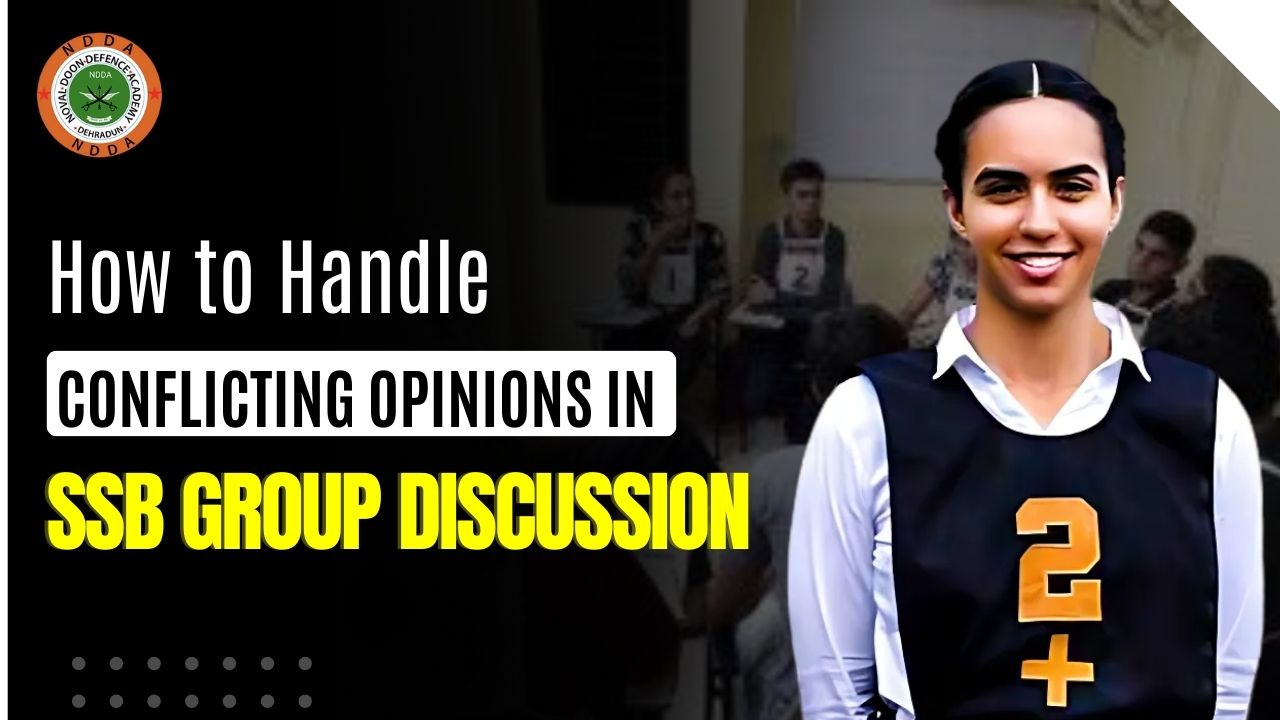How to Handle Conflicting Opinions in SSB Group Discussion

Table of Contents
“Diversity of thought is the foundation of innovation.” The quote competently sums up why differing opinions are important, especially in the SSB Group Discussion. Handling conflicting opinions during a group discussion may seem sticky, but that is precisely something you need to master in order to stand out in the selection process. This blog will guide you with effective strategies to manage conflicting viewpoints and common pitfalls to avoid during your SSB preparation.
Whether it is AFCAT (Air Force Common Admission Test), NDA (National Defence Academy), or CDS (Combined Defence Services) group discussions are an essential part of the process as it gives an opportunity to demonstrate your leadership and teamwork skills.
The Role of Group Discussions in SSB
During the discussions in SSB Group, assessors evaluate you for qualities like communication, teamwork, and leadership. It will be similar to what will happen in real life: candidates must work together, analyze problems, and reach a resolution. Evidently, there are different opinions since each person will have different perspectives.
Instead of dreading these conflicts, view them as an opportunity to demonstrate your ability to manage disagreements effectively. Well-handled conflicts reflect problem-solving skills, patience, and leadership-all essential qualities for successful SSB selection.
Key Strategies for Handling Conflicting Opinions
Here are some practical tips to handle conflicting opinions during your SSB Group Discussions:
1. Acknowledge the Opposing Viewpoint
Respect begins with listening. Pay attention to what others are saying and validate their opinions. For example, use phrases like, “That’s an interesting perspective. Let me share my thoughts on it.” This shows assessors that you value teamwork and are open to ideas.
2. Present Your Reasoning Clearly
Keep your arguments simple and logical. Avoid using complicated jargon or lengthy explanations. Remember, clarity wins in SSB Group Discussions. A well-presented idea can often resolve disagreements effectively.
3. Focus on the Bigger Picture
Instead of getting caught up in minor disagreements, steer the discussion toward common goals. For example, say, “Our main objective here is to solve the problem effectively as a group.” This keeps the conversation productive.
4. Use "We" Language
Replace “I” with “we” to promote teamwork. Statements such as, “We can all agree that this solution is practical,” promote unity in the discussion. This approach makes you stand out as a team player in SSB Group Discussions.
5. Be Open to Compromise
Adaptability is the key. If someone has a valid point, acknowledge it and blend it with your ideas to create a balanced solution. This reflects your flexibility and collaboration skills.
6. Be Positive About Your Body Language
Your body speaks volumes. Smile, maintain eye contact, and avoid crossing your arms. Positive body language is reflective of confidence and ensures that the discussion remains friendly even while disagreeing.
What to Avoid in SSB Group Discussions
While dealing with conflicts, here are a few things to avoid:
1. Personal Attacks
Never degrade or criticize someone’s view directly. Always keep the discussion professional and respectful.
2. Dominating the Discussion
It is always important to give others a chance to speak. Dominating the discussion makes you look self-centered and hurts the group dynamic.
3. Aggressive Tone
Even if you are strongly opposed, keep it polite and calm. Aggression can give a wrong impression during SSB Group Discussions.
4. Ignoring Counterarguments
Pay attention to and respond to rival views. Disregarding others gives the impression that you are inflexible and close-minded.
Benefits of Handling Conflicts Effectively
There are many advantages of becoming proficient in conflict management techniques in SSB Group Discussions.
- It increases group harmony and productivity.
- This helps in making a good impression before the assessors by demonstrating leadership and communication.
- It improves self-confidence and overall performance.
Practical Example
Two participants in an SSB GD take opposing views. Instead of siding with either, you summarize both the persons’ points, validate both, and then propose a compromise that combines the virtues of the two stands. Not only do you keep the discussion productive but also bring out your problem-solving ability and your leadership qualities.
Conclusion
Handling conflicting opinions in SSB Group Discussions is not about winning arguments but about creating harmony in the group. Acknowledge opposing views, present your ideas clearly, and focus on teamwork.
By practicing these strategies in mock group discussions, you’ll build the confidence to handle any situation gracefully. Remember, SSB assessors are not just looking for individual brilliance but the ability to shine as part of a team.
You May Also like:
FAQ
Stay calm and wait for the right moment to interject politely. Use phrases like, “I’d like to add to this point if I may.”
Yes! Flexibility is a positive trait. Acknowledge the better argument and align with it if it makes sense.
Absolutely. Disagree respectfully and back your points with logic. It shows confidence and critical thinking.
If your opinion is valid, calmly reiterate your points with logical reasoning. If the group remains unconvinced, adapt and contribute to the dominant opinion positively.
Practice mock GDs with friends or peers. Focus on breathing deeply to stay calm and maintain a confident posture.
Don’t get flustered. Politely say, “Let me finish my point and then I’d love to hear your thoughts.”
These exams are gateways to the SSB process, where group discussions test your teamwork, leadership, and problem-solving abilities.
Yes, but use it carefully. A light joke can diffuse tension, but ensure it’s appropriate and doesn’t offend anyone.
Silence is better than arguing aggressively, but you should still contribute to the discussion. Even one meaningful point can leave a positive impression.
Participate in mock GDs, watch online SSB GD videos, and seek feedback from mentors to refine your approach.
Reach Us